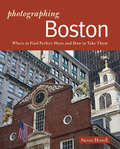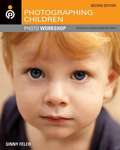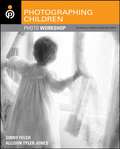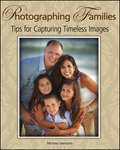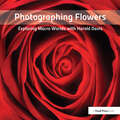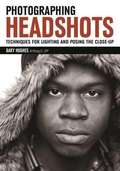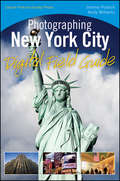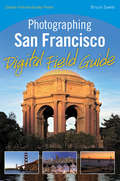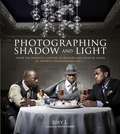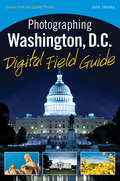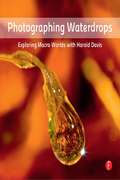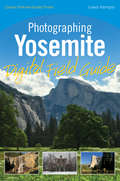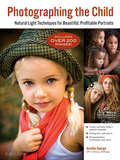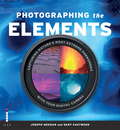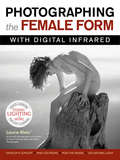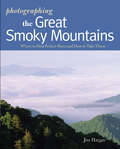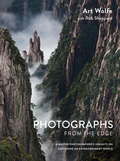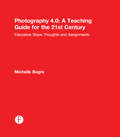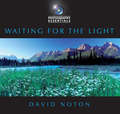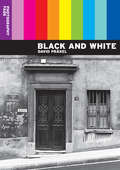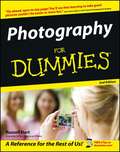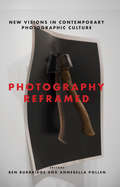- Table View
- List View
Photographing Boston: Where to Find Perfect Shots and How to Take Them
by Steven HowellFrom historic and iconic Beantown bravado to modern skyscrapers and urban scenery and greenery, this guide offers more than 100 Boston photo opportunities. Beginners, avid amateurs, and seasoned pros alike will appreciate the wide array of photography subjects and themes covered in The Photographer’s Guide to Boston. Conveniently and logically organized by neighborhood, you’ll visit the Freedom Trail, the Emerald Necklace, Beacon Hill, the North End, Back Bay, the Fens, and South Boston, along with many other photogenic historic and modern sites. Author Steven Howell has created the perfect photographer’s travel companion.
Photographing Children Photo Workshop, Second Edition
by Ginny FelchCapture the essence of childhood through digital photography with this helpful resource Family photography continues to be a major field of professional digital photography, while amateur moms are the fastest growing segment of digital camera owners. No matter your level of expertise, you'll benefit from the invaluable advice featured in this new edition. Updated with new photos and revised text to cover the latest technologies, this inspirational book offers critical assistance with photographing children in portrait or candid situations, natural environments or structured interiors, and any variety of lighting. You'll find practical techniques as well as artistic guidance to capture a photo that radiates the innocence and magic of childhood. Offers a strong understanding of photography's fundamentals and explains how they are crucial to capturing memorable images of children Covers all the latest equipment and technology including mobile phones and HD video, and details how to capture fantastic images no matter the medium Instructs you on how to effectively photograph children in a variety of situations, lighting, environments, weather, etc. Shares insider advice on how to take frame-worthy photos of children that emanate the magic of childhood Photographing Children Photo Workshop, Second Edition shows you how to sharpen your observation skills and involve your subjects so you can take memorable photos of children that will last for generations.
Photographing Children Photo Workshop: Develop Your Digital Photography Talent (Photo Workshop #5)
by Ginny FelchWhile digital technology has made acceptable photos easy to achieve, this book is about taking exceptional photos that preserve the essence of childhood.You?ll learn to trust your instincts and your own unique vision and discover how to create beautiful photographs in a variety of lighting situations, all while sharpening your observation skills and learning how to involve your subjects. Plus, insightful tips on understanding what equipment is right for you will help you get great results when working with any age group.
Photographing Families: Tips for Capturing Timeless Images
by Michele CelentanoCreate family portraits to cherish for a lifetime Family photographs are a staple of both amateur and professional photography. While always in demand, they also pose a unique set of challenges. In this book, Canon Explorer of Light Michele Celentano guides beginning- to intermediate-level photographers around the common pitfalls and helps them learn how to get top-quality shots every time. From getting families organized and directing the posing to managing large groups and impatient kids, this book reveals the secrets and helps you capture the shot without relying on post-production to achieve perfection. Whether you're a professional seeking to advance your knowledge or the family's designated picture-taker, you'll benefit from these professional tips. You'll learn camera techniques that can take pounds and years off your subjects and create images that stand the test of time. Family pictures are a photographic staple with their own set of challenges; this book offers tried-and-true advice for both hobbyists and professionals Veteran photographer and Canon Explorer of Light Michele Celentano guides you through getting families prepared for a photo session, directing the poses, handling challenging personalities, and creating memorable settings Helps you capture the perfect shot in the camera without relying on post-production to make it right Reveals secrets that can help your subjects shed pounds and years Packed with advice to help you keep your photos from showing up on awkwardfamilyphotos.com Photographing Families: Tips for Capturing Timeless Images is loaded with insider tips to help you make family portraits the treasure they should be.
Photographing Flowers: Exploring Macro Worlds with Harold Davis
by Harold DavisCapture stunning macro floral images with this gorgeous guide by acclaimed photographer Harold Davis. You'll learn about different types of flowers, macro equipment basics, and the intricacies of shooting different floral varieties in the field and in the studio. Harold also shows you techniques in the Photoshop darkroom that can be applied to flower photography to help you get the most out of your images. Beautiful and authoritative, this guide to photographing flowers is a must-read for every photographer interested in flower photography. Photographing Flowers will also win a place in the hearts of those who simply love striking floral imagery.
Photographing Headshots
by Gary HughesHeadshots--images that include the subject’s head and shoulders--are big business for photographers. These types of images are needed by individuals from all walks of life--from business tycoons to actors and models. While most clients who book portrait sessions want images that document a moment in time, special event, or aspect of their personality (and file them away or share them with family or friends), headshots are very public. They grace annual reports, appear on business cards and websites, and take up prime real estate in the portfolios of those who seek to appear in fashion magazines, product ads, on stage, and on the screen. In short, clients need tailored images that speak of a business proficiency, appear pleasant, and simply communicate their core characteristics to viewers. In this book, Hughes provides solid lighting and posing techniques that will yield repeatable, polished portrait results that please subjects and get them noticed.
Photographing New York City Digital Field Guide
by Andy Williams Jeremy PollackTake memorable photos of the most popular attractions in the Big Apple!Whether using a point-and-shoot or a high-end dSLR, this companion guide provides you with detailed information for taking amazing shots of one of one of the world's most photographed cities. Whether you aim to capture the regal Empire State Building, vibrant Times Square, historic Grand Central Station, massive Central Park, or one of New York City's many other landmarks, this portable resource goes where you go and walks you through valuable tips and techniques for taking the best shot possible. You'll discover suggested locations for taking photos, recommended equipment, what camera settings to use, best times of day to photograph specific attractions, how to handle weather challenges, and more. In addition, beautiful images of New York City's most breathtaking attractions and recognizable landmarks serve to both inspire and assist you as you embark on an amazing photographic adventure!Elevates your photography skills to a new level with photography secrets from professional photographer and SmugMug COO, Andy Williams Presents clear, understandable tips and techniques that span all skill levels, using all types of digital cameras, from full-featured compact cameras to high end DSLRsFeatures New York City's main attractions in alphabetical order as well as thumb tabs on the pages so you can quickly and easily access the information you are looking forShares detailed information and insight on critical topics, such as ideal locations to photograph from, the best time of day to shoot, camera equipment to have handy, weather conditions, and optimal camera settings to considerWhether you're a local familiar with the territory or a visitor seeing the Big Apple for the first time, this handy guide will help you capture fantastic photos!
Photographing Newborns
by Mimika CooneyIn this comprehensive book, Cooney touches on each facet of being a successful newborn portrait photographer. She begins by outlining the foundation of her business model and provides insight for the reader to establish something similar for their business. Defining your target market and ideal customer profile are essential to guiding your business in the right direction. Cooney focuses her business, and this book, on what she calls a 'boutique’ brand. These are pricier photo shoots and packages, which require more time and care. Working with clients at this level often creates a lasting relationship and hopefully, repeat business. This is where the branding of your business is so important. Not only can it deliver regular clients, but can also inspire important word-of-mouth references. Emphasizing how important it is for a photography studio to have structure and direction to become and remain successful, Cooney walks the reader through many scenarios that have helped form her business. A strong social media presence, creative marketing & promotions and repeat customers are the key to standing apart from the competition, therefor remaining vital.
Photographing San Francisco Digital Field Guide
by Bruce SawleA compact, full-color companion guide to photographing San Francisco! Whether using a full-featured compact camera or a high-end dSLR, this companion guide provides you with detailed information for taking stunning shots of beautiful San Francisco. Whether you aim to capture breathtaking photos of the majestic Golden Gate Bridge, crooked Lombard Street, infamous Alcatraz, or unique Victorian homes, this portable resource goes where you go and walks you through valuable tips and techniques for taking the best shot possible. You'll discover suggested locations for taking photos, recommended equipment, what camera settings to use, best times of day to photograph specific attractions, how to handle weather challenges, and more. In addition, lovely images of San Francisco's most breathtaking attractions and recognizable landmarks serve to both inspire and assist you as you embark on an amazing photographic adventure! Elevates your photography skills to a new level with photography secrets from professional photographer Bruce Sawle Presents clear, understandable tips and techniques that span all skill levels, using all types of digital cameras, from compacts to high end DSLRs Features San Fransisco's main attractions in alphabetical order as well as thumb tabs on the pages so you can quickly and easily access the information you are looking for Shares detailed information and insight on critical topics, such as ideal locations to photograph from, the best time of day to shoot, camera equipment to have handy, weather conditions, and optimal camera settings to consider Whether you're a local familiar with the territory or a visitor seeing San Francisco for the first time, this handy guide will help you capture fantastic photos!
Photographing Shadow and Light: Inside the Dramatic Lighting Techniques and Creative Vision of Portrait Photographer Joey L.
by Joey L. David HobbyAspiring photographers are always looking for that edge, that fresh point of view to add drama to their images. Photographer Joey L. found his vision early, drawing critical acclaim as a brilliant commercial photographer with a distinctive technical expertise for lighting. In Photographing Shadow and Light, Joey lifts the curtain on his dramatic, creatively fearless approach to portraiture, sharing his personal philosophy and a behind-the-scenes look at 15 striking photo sessions--from personal projects shot in Africa, India, and Brooklyn to commercial shoots for 50 Cent, the Jonas Brothers, and Project Runway All Stars. Joey provides readers with a step-by-step description of how he visualized each shoot, formed meaningful connections with his subjects, and "built" his signature dramatic lighting effects--one light at a time. Featuring more than 85 stunning portraits, detailed lighting diagrams, and a foreword from industry icon David Hobby (aka Strobist), Photographing Shadow and Light shares the creative process behind one of today's most exciting photography talents, providing serious amateurs and professionals a fresh perspective on creating compelling, professional quality portraits. "Joey Lawrence is . . . the future of photography. Get used to it." --David Hobby (Strobist) Get inside the images of commercial and fine art portrait photographer Joey L. with this behind-the-lens guide to his fearless approach, creative vision, and signature lighting techniques.Also available as an ebookFrom the Trade Paperback edition.
Photographing Washington, D.C. Digital Field Guide
by John HealeyThe ideal companion guide for capturing awe-inspiring photos of Washington, D. C. ! Whether using a compact camera or a high-end dSLR, this companion guide provides you with detailed information for taking spectacular shots of some of the most recognizable architecture in the world. Whether you aim to capture memorable photos of the White House, U. S. Capitol, Washington Monument, Lincoln Memorial, or one of D. C. 's other many remarkable memorials, this portable resource goes where you go and walks you through valuable tips and techniques for taking the best shot possible. You'll discover suggested locations for taking photos, recommended equipment, what camera settings to use, best times of day to photograph specific attractions, how to handle weather challenges, and more. In addition, beautiful images of Washington, D. C. 's most breathtaking attractions and recognizable landmarks serve to both inspire and assist you as you embark on an amazing photographic adventure! Elevates your photography skills to a new level with photography secrets from professional photographer John Healey Presents clear, understandable tips and techniques that span all skill levels, using all types of digital cameras, from compact cameras to high end DSLRs Features Washington, D. C. 's main attractions in alphabetical order as well as thumb tabs on the pages so you can quickly and easily access the information you are looking for Shares detailed information and insight on critical topics, such as ideal locations to photograph from, the best time of day to shoot, camera equipment to have handy, weather conditions, and optimal camera settings to consider Whether you're a local familiar with the territory or a visitor seeing our nation's capital for the first time, this handy guide will help capture fantastic photos!
Photographing Waterdrops: Exploring Macro Worlds with Harold Davis
by Harold DavisCapturing the fleeting, dynamic world contained within the tiniest of water droplets is one of the most challenging photographic endeavors. Like many things, the challenge is worth the effort - when done with skill, these images can become some of the most unique shots you've ever taken. In this gorgeous guide packed with creative insipration alongside technical expertise, award-winning photographer Harold Davis shows you how he creates his stunning water drop images. From challenges to working with constantly moving subjects and reflected light to basic info on which equipment works best, this book will help all macro-loving photographers turn their lens on water, water, everywhere.
Photographing Yosemite Digital Field Guide
by Lewis KemperThe ideal companion guide for capturing awe-inspiring photos of Yosemite! Whether using a compact camera or a high-end dSLR, this companion guide provides you with detailed information for taking spectacular shots of some of the most recognizable landmarks in the world. Whether you aim to capture memorable photos of Half Dome, El Capitan, Vernal Fall, Mariposa Grove, or one of Yosemite's other many remarkable attractions, this portable resource goes where you go and walks you through valuable tips and techniques for taking the best shot possible. You'll discover suggested locations for taking photos, recommended equipment, what camera settings to use, best times of day to photograph specific attractions, how to handle weather challenges, and more. In addition, beautiful images of Yosemite's most breathtaking attractions and recognizable landmarks serve to both inspire and assist you as you embark on an amazing photographic adventure! Elevates your photography skills to a new level with photography secrets from professional photographer Lewis Kemper Presents clear, understandable tips and techniques that span all skill levels, using all types of digital cameras, from compact cameras to high end DSLRs Features Yosemite's main attractions in alphabetical order as well as thumb tabs on the pages so you can quickly and easily access the information you are looking for Shares detailed information and insight on critical topics, such as ideal locations to photograph from, the best time of day to shoot, camera equipment to have handy, weather conditions, and optimal camera settings to consider Whether you're a local familiar with the territory or a visitor seeing this beautiful U. S. National Park for the first time, this handy guide will help capture fantastic photos!
Photographing the Child
by Jennifer GeorgePacked full of useful tips, techniques, and information for both the hobbyist and the professional photographer, this book is an invaluable resource for developing the craft of child photography. Beginning with how to handle children as subjects, it discusses such topics as interacting with children, how to avoid tantrums, letting personality dictate the photo session, and how to capture expressions that parents want. It then explores what good light is, how to find it, how to use it, and how to pose a child in it, as well as exposure, posing, and design fundamentals. Each subject is covered from beginner to advanced level in child photography, so parents and professionals alike will find helpful information. From traditional portraits to lifestyle ones, this book covers all the necessary knowledge for capture stunning images of children.
Photographing the Elements: Capturing Nature's Most Extreme Phenomena With Your Digital Camera
by Gary Eastwood Joseph MeehanBlizzards, tornados, volcanic eruptions, and desert sandstorms? Forget about seeking shelter - these are the prime times to grab your gear and get one-of-a-kind photographs of the most exotic and extraordinary subjects on earth. Miles away from your typical landscape and nature shots, these powerful images are a stunning survey of natural wonders, a vibrant addition to any portfolio, and a testament to the adventurous spirit of the extreme photographer. Get out of your comfort zone and embrace the elements!
Photographing the Female Form with Digital Infrared
by Laurie KleinPhotographing female nudes is about more than just the body. For Laurie Klein, it is about capturing the feminine spirit. Laurie's creative medium is nature. The landscape plays as much of a role in her photos as does the model. Laurie's unique way of using infrared photography, and the caring, personal way she captures her subject's innermost emotions becomes a transformational experience for both photographer and client. In this book, Klein details her techniques and her inspirations in creating these unforgettable images.Shooting nudes in nature is complex. The photographer needs to know when to start with the model and arrange nature around them or see something in nature and treat the model as part of the nature. Klein gives many ideas for posing models in relationship to nature and the landscape. She masterfully uses infrared photography to capture the beauty of the surroundings and the female form. Each photo in the book is accompanied by details of the location or setting, camera settings, composition concepts and insight into the idea and execution of the shot.Part of what makes Klein's photos so unique and vibrant is that she develops a trusting environment that allows the subject to give themselves over completely to a transcendent photographic experience. Out of this usually comes a series of fine art portraits or a substantial book for them to enjoy, share and pass on through the generations.Using the body as a landscape, Klein crafts unique and sometimes abstract images that emphasize the beauty of the female form in different ways. Sometimes the simplicity of the image is the beauty of it. The infrared photography format provides striking contrasts between the skin tones and the natural surroundings. Tips are given for choosing unique locations that can work best for creating artful images like the ones in the book. Being able to improvise and set-up a shoot when discovering a unique setting or lighting scenario can be the key to crafting a stunning portrait. Sometimes the unexpected can occur and a prepared and creative photographer can turn that into a magical moment captured in infrared.Klein is recognized for her signature infrared photography style. This book provides in insight into her creative process.
Photographing the Female Form with Digital Infrared
by Laurie KleinPhotographing female nudes is about more than just the body. For Laurie Klein, it is about capturing the feminine spirit. Laurie's creative medium is nature. The landscape plays as much of a role in her photos as does the model. Laurie's unique way of using infrared photography, and the caring, personal way she captures her subject's innermost emotions becomes a transformational experience for both photographer and client. In this book, Klein details her techniques and her inspirations in creating these unforgettable images.Shooting nudes in nature is complex. The photographer needs to know when to start with the model and arrange nature around them or see something in nature and treat the model as part of the nature. Klein gives many ideas for posing models in relationship to nature and the landscape. She masterfully uses infrared photography to capture the beauty of the surroundings and the female form. Each photo in the book is accompanied by details of the location or setting, camera settings, composition concepts and insight into the idea and execution of the shot.Part of what makes Klein's photos so unique and vibrant is that she develops a trusting environment that allows the subject to give themselves over completely to a transcendent photographic experience. Out of this usually comes a series of fine art portraits or a substantial book for them to enjoy, share and pass on through the generations.Using the body as a landscape, Klein crafts unique and sometimes abstract images that emphasize the beauty of the female form in different ways. Sometimes the simplicity of the image is the beauty of it. The infrared photography format provides striking contrasts between the skin tones and the natural surroundings. Tips are given for choosing unique locations that can work best for creating artful images like the ones in the book. Being able to improvise and set-up a shoot when discovering a unique setting or lighting scenario can be the key to crafting a stunning portrait. Sometimes the unexpected can occur and a prepared and creative photographer can turn that into a magical moment captured in infrared.Klein is recognized for her signature infrared photography style. This book provides in insight into her creative process.
Photographing the Great Smoky Mountains: Where to Find Perfect Shots and How to Take Them
by Jim HarganFind countless opportunities to capture the beauty and natural diversity of America's most visited national park. On the border between North Carolina and Tennessee lie the forests and mountains of America’s most visited national park, Great Smoky Mountains National Park. Renowned for the diversity of its plant and animal life—the most biological diversity of any area in the world’s temperate zone—this beautiful place also boasts some of the last remaining pockets of Southern Appalachian mountain culture. The park offers countless opportunities to capture its beauty and diversity on film, and in this book professional photographer and writer Jim Hargan leads you to some of the best photo sites throughout this 800-square-mile wonderland.
Photographs from the Edge: A Master Photographer's Insights on Capturing an Extraordinary World
by Art Wolfe Rob SheppardLegendary nature photographer Art Wolfe presents an intimate, behind-the-scenes guide to the experiences, decisions, and methods that helped him capture images from some of the most exciting locations across the globe. Wolfe takes you from the mountains of the Himalayas to the sandy shores of Mnemba Island, with stops in the crowded streets of India and the alkali lakes of Africa along the way. You'll learn the equipment, settings, and creative choices behind each photograph. From endangered species to cultural celebrations to natural wonders, Wolfe brings each subject to life through his stunning photography and the stories he shares in this one-of-a-kind photo safari.From the Hardcover edition.
Photography 4.0: Educators Share Thoughts and Assignments (Photography Educators Series)
by Michelle BogreAn invaluable resource for photography educators, this volume is a survey of photographic education in the first decade of the 21st Century. Drawing upon her 25 years of teaching experience and her professional network, Michelle Bogre spoke with 47 photo educators from all over the world to compile this diverse set of interviews. The themes of these conversations explore: Why students should study photography The value of a formal photography degree Teaching philosophies Whether video and multimedia should be an essential part of a photographic curricula The challenges of teaching photography today Changes in photographic education overall The second half of the book shares 70 photography assignments of varying level of difficulty from these educators, some paired with examples of how students completed them. This book will inspire and invigorate any photography educator’s curriculum.
Photography Careers: Finding Your True Path
by Mark JenkinsonPhotography Careers offers students an indispensable guide to beginning their professional journeys as photographers. This book presents the variety of career options available to those entering the competitive and comprehensive world of photography. With the insight and advice from industry mavens and the author himself, Photography Careers will help you change the way you evaluate your strengths as an artist and find your place in the photography community. Features include: Interviews with successful young professional photographer in a wide range of photographic specialties, from fashion photography to cinematography, and other industry related fields such as retouching, fine art sales, and photo editing Tips for how to find unique approaches in a saturated market Best practices for student looking at graduate programs, a budding career, and as a personal business
Photography Essentials: Waiting for the Light (Photography Essentials)
by David NotonWaiting for the Light is a breathtaking visual celebration of award-winning landscape photographer David Noton's work to date. A long-awaited exploration of David's images, this book showcases the very best from his extensive portfolio, with photographs from every continent.David offers amateurs and professionals alike the opportunity to learn about his techniques and equipment, and find out how to achieve similar results in their own work. The book also includes an invaluable chapter exploring the incorporation of digital techniques. Beautiful images combined with explanatory captions and practical, revealing text, make this an indispensable must-have for any photographer.
Photography FAQs: Black and White
by David PräkelPhotography FAQs: Black and White covers every aspect of black & white photography, from capturing the image to filtration, to developing and printing an image and successful presentation.The title offers detailed responses to the key, reader-defined questions drawn from photographic workshops, consumer press and internet forums, and, as such, is an invaluable and handy reference.The Photography FAQs series is a comprehensive, pocket-size reference for the amateur photographer in the field (or the studio). Each title is formulated as an encyclopaedia of 50 questions and answers covering every aspect of the key photography subjects that come up again and again, including genres such as landscape, portraiture and travel and shooting in monochrome. Each topic is supported by lively, accessible text, inspirational images and clear, easy-to-navigate design that makes this series a quick-and easy reference.
Photography For Dummies
by Russell HartYour personal photographs have a worth that can't be measured in dollars and cents. They're likely the one thing you would grab on the way out of a burning house - an irreplaceable record of the life you lead, of friends and family, and of the occasions with which you mark passing years. The funny thing is, most people aren't entirely happy with their photographs. And that's where Photography For Dummies comes in. You don't need a fancy camera with multiple, removable lenses to get good pictures. The problem is, nearly every book on photography assumes that you're using one. But this book assumes that you're using a point-and-shoot camera for all your pictures. In fact, this may be the most complete guide available for taking pictures with a modern point-and-shoot camera. This revised edition of Photography For Dummies helps you choose film (much simpler than you'd think), load film into the camera (no big sweat), and understand how to hold the camera (yes, there are right and wrong ways). You'll also discover tips about dealing with your photofinisher - a far more important factor in getting good results than most people realize, especially in the digital age. What's more, you'll gain insight into Working with your camera, and how different settings make your camera do different things Understanding the importance of light in a photograph, and applying design strategies that make your subjects stand out Getting shots that both flatter people and capture their personalities Shooting landscapes, and the special considerations of travel photography Taking pictures filmlessly, and the pleasures and pitfalls of digital photography Troubleshooting your camera, and discovering what do try if it won't shoot Today's point-and-shoot cameras are remarkably reliable devices. So why aren't your pictures better? The main secret to better photographs is knowing what to shoot, when to shoot it, and how to shoot it. You need Photography For Dummies, because it lets you in on this secret.
Photography Reframed: New Visions in Contemporary Photographic Culture (International Library Of Visual Culture Ser.)
by Ben BurbridgeAt a critical point in the development of photography, this book offers an engaging, detailed and far-reaching examination of the key issues that are defining contemporary photographic culture. Photography Reframed addresses the impact of radical technological, social and political change across a diverse set of photographic territories: the ontology of photography; the impact of mass photographic practice; the public display of intimate life; the current state of documentary, and the political possibilities of photographic culture. These lively, accessible essays by some of the best writers in photography together go deep into the most up-to-date frameworks for analysing and understanding photographic culture and shedding light on its histories. Photography Reframed is a vital road map for anyone interested in what photography has been, what it has become, and where it is going.
